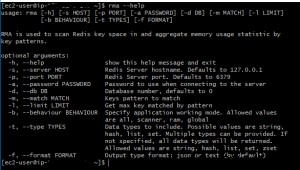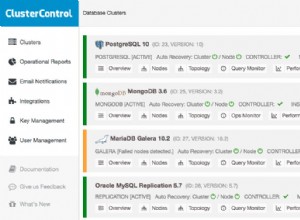In MongoDB der $switch Der Aggregations-Pipeline-Operator wertet eine Reihe von case aus Ausdrücke und führt einen angegebenen Ausdruck nur aus, wenn ein case Ausdruck wird zu true ausgewertet .
Syntax
Die Syntax sieht so aus:
$switch: {
branches: [
{ case: <expression>, then: <expression> },
{ case: <expression>, then: <expression> },
...
],
default: <expression>
}Beispiel
Angenommen, wir haben eine Sammlung namens pets mit folgenden Dokumenten:
{ "_id" : 1, "name" : "Wag", "type" : "Dog", "weight" : 20 }
{ "_id" : 2, "name" : "Bark", "type" : "Dog", "weight" : 10 }
{ "_id" : 3, "name" : "Meow", "type" : "Cat", "weight" : 7 }
{ "_id" : 4, "name" : "Scratch", "type" : "Cat", "weight" : 8 }
{ "_id" : 5, "name" : "Bruce", "type" : "Kangaroo", "weight" : 100 }
{ "_id" : 6, "name" : "Hop", "type" : "Kangaroo", "weight" : 130 }
{ "_id" : 7, "name" : "Punch", "type" : "Kangaroo", "weight" : 200 }
{ "_id" : 8, "name" : "Snap", "type" : "Cat", "weight" : 12 }
{ "_id" : 9, "name" : "Ruff", "type" : "Dog", "weight" : 30 }
Wir können den $switch verwenden -Operator, um einige case-Ausdrücke gegen das weight auszuführen Feld:
db.pets.aggregate(
[
{
$project:
{
_id: 0,
weight: 1,
result: {
$switch: {
branches: [
{ case: { $gt: [ "$weight", 100 ] }, then: "Heavy" },
{ case: { $lt: [ "$weight", 20 ] }, then: "Light" }
],
default: "Medium"
}
}
}
}
]
)Ergebnis:
{ "weight" : 20, "result" : "Medium" }
{ "weight" : 10, "result" : "Light" }
{ "weight" : 7, "result" : "Light" }
{ "weight" : 8, "result" : "Light" }
{ "weight" : 100, "result" : "Medium" }
{ "weight" : 130, "result" : "Heavy" }
{ "weight" : 200, "result" : "Heavy" }
{ "weight" : 12, "result" : "Light" }
{ "weight" : 30, "result" : "Medium" } Weglassen des Standardausdrucks
Weglassen des default aus dem Code kann zu einem Fehler führen. Dies hängt jedoch vom Ausgang des case ab Ausdrücke.
Wenn wir die default entfernen Teil des obigen Beispiels erhalten wir einen Fehler:
db.pets.aggregate(
[
{
$project:
{
_id: 0,
weight: 1,
result: {
$switch: {
branches: [
{ case: { $gt: [ "$weight", 100 ] }, then: "Heavy" },
{ case: { $lt: [ "$weight", 20 ] }, then: "Light" }
]
}
}
}
}
]
)Ergebnis:
uncaught exception: Error: command failed: {
"ok" : 0,
"errmsg" : "$switch could not find a matching branch for an input, and no default was specified.",
"code" : 40066,
"codeName" : "Location40066"
} : aggregate failed :
example@sqldat.com/mongo/shell/utils.js:25:13
example@sqldat.com/mongo/shell/assert.js:18:14
example@sqldat.com/mongo/shell/assert.js:639:17
example@sqldat.com/mongo/shell/assert.js:729:16
example@sqldat.com/mongo/shell/db.js:266:5
example@sqldat.com/mongo/shell/collection.js:1058:12
@(shell):1:1
In diesem Fall gab es Eingabewerte, die nicht vom case abgedeckt wurden Ausdrücke (d. h. solche zwischen 20 und 100) und so $switch hat einen Fehler zurückgegeben.
Wenn wir jedoch die case ändern Ausdrücke leicht, können wir den default entfernen Teil ohne Fehler:
db.pets.aggregate(
[
{
$project:
{
_id: 0,
weight: 1,
result: {
$switch: {
branches: [
{ case: { $gt: [ "$weight", 100 ] }, then: "Heavy" },
{ case: { $lte: [ "$weight", 100 ] }, then: "Light" }
]
}
}
}
}
]
)Ergebnis:
{ "weight" : 20, "result" : "Light" }
{ "weight" : 10, "result" : "Light" }
{ "weight" : 7, "result" : "Light" }
{ "weight" : 8, "result" : "Light" }
{ "weight" : 100, "result" : "Light" }
{ "weight" : 130, "result" : "Heavy" }
{ "weight" : 200, "result" : "Heavy" }
{ "weight" : 12, "result" : "Light" }
{ "weight" : 30, "result" : "Light" }
In diesem Beispiel erfüllten alle Dokumente alle case Ausdrücke und damit der default wurde nicht benötigt – was bedeutete, dass kein Fehler erzeugt wurde.
MongoDB-Dokumentation
Weitere Details und Beispiele finden Sie in der MongoDB-Dokumentation.




